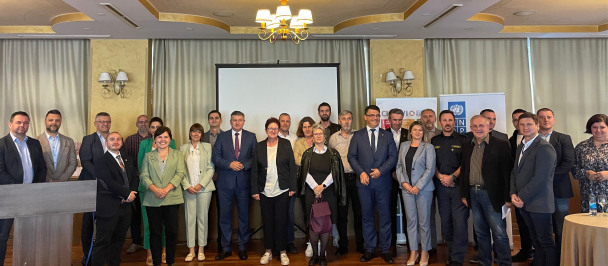Following a five-day training aimed at enhancing capacities and preparedness of the local communities in BiH to respond to displacement, 34 persons were certified as camp coordination and camp management (CCCM) trainers. The goal of the training was to ensure that services and protection in a local community are in accordance with local and international laws, guidelines and agreed standards, with a view of improving the quality of lives and dignity in case of disaster-inducted displacement.
The training was organized within the Joint Programme “Disaster Risk Reduction for Sustainable Development in Bosnia and Herzegovina”, funded by the Swiss Government and the United Nations (UN), the aim of which is to address key DRR priorities as set by the local authorities and various stakeholders in different sectors: protection and rescue, education, social and child protection, health and agriculture.
Camp management consists of providing support and protection to internally displaced population affected by natural or other disasters, who are housed in camps, in accordance with the legal framework governing protection and humanitarian standards. CCCM aims at improving the living conditions for displaced persons, ensuring them support and protection at a place of displacement and finding durable solutions which will end temporary accommodation.
Idriz Brković, Head of Division for Strategic Planning, Protection and Rescue Measures, of the BIH Ministry for Security, has emphasized that “protection and rescue must be a prioritized security interest of the state and its implementation increases state security and reduces the number of human victims and physical damage. He has added that the Joint Programme is crucial for BiH as it improves inter-institutional coordination and cooperation, along with active engagement of local communities which are at high risk of disasters in the processes of planning and implementing measures in the field”.
The effects of climate change are increasingly visible across the world, including Bosnia and Herzegovina, which leads to the risk of major displacement of the population. Preparedness for response to the consequences of climate change is becoming ever more important today.
Haris Magrdžija, Coordinator for Migration, Assistance in Cash and Vouchers and Mine Safety Trainer at the Red Cross of the BiH Federation, has said: “The training is an excellent example of improving cooperation of the UN agencies with the Red Cross and the Civil Protection as the key local stakeholders in preparedness for and recovery from disasters”.
Training of new CCCM trainers enhanced capacities of the local communities vulnerable to disasters in Bosnia and Herzegovina to be better prepared for response to displacement through protection and gender-sensitive approach.
“Participation in training is an extremely important experience in view of extreme situations that are happening to us, which result in the need for mass accommodation of population. During the training, we acquired new knowledge and methodologies in this area and at the same time we exchanged experiences with the participants who are experts in their respective fields”, emphasized Vesna Šipka, Independent Expert Associate for the Planning of Protection and Rescue from Natural and Other Disasters, the City Administration of Banja Luka/Civil Protection Service of the City of Banja Luka.
In order to ensure quality and comprehensiveness, the implementation of the Training of Trainer Programme includes the Ministry for Security of Bosnia and Herzegovina – Protection and Rescue Department, entity-level Civil Protection Administrations of the Federation of Bosnia and Herzegovina and the Republika Srpska, the Red Cross of the FBiH Entity, the RS Red Cross and the Red Cross Society of Bosnia and Herzegovina, and the local communities in BiH which are vulnerable to disasters.
The following UN agencies are implementing the Joint Programme: the United Nations Development Programme (UNDP), the United Nations Children’s Fund (UNICEF), the United Nations Educational, Scientific and Cultural Organization (UNESCO), the United Nations Population Fund (UNFPA) and the United Nations Food and Agriculture Organization (FAO), in partnership with local authorities and relevant implementing partners from the government and non-governmental sectors. CCCM training has been developed and implemented by the International Organization for Migration (IOM) Bosnia and Herzegovina, which is a partner in the implementation of this activity.
For additional information please contact:
Ajla Mostarac, UNDP: ajla.mostarac@undp.org
Nineta Popović, UNICEF: npopovic@unicef.org
Majda Prljača, UNFPA: prljaca@unfpa.org
Lejla Hrelja, UNESCO: l.hrelja@unesco.org
Vlado Pijunović, FAO: Vlado.Pijunovic@fao.org

 Locations
Locations








